TI公司的TDA2x是能滿足高級駕駛員輔助系統(ADAS)設計要求的系統級芯片(SoC),采用多相可升級的架構,包括固定和浮點TMS320C66x數字信號處理器(DSP)產生核,Vision AccelerationPac, ARMCortex-A15 MPCore?和雙Cortex-M4處理器.此外還集成了主外設,包括用于LVDS環視系統的多照相機接口(并行和串行),顯示器,CAN和GigB以太網AVB.主要用在單或立體前端照相機,LVDS或以太網環視以及傳感器融合如可視,雷達,超聲和激光雷達傳感器.本文介紹了TDA2x系列主要特性,框圖以及評估模塊TDA2x EVM包括TDA2x EVM CPU 板和VisionSuper28視頻應用板主要特性,電路圖和材料清單.
TI’s new TDA2x System-on-Chip (SoC) is a highly optimized and scalable family of devices designed tomeet the requirements of leading Advanced Driver Assistance Systems (ADAS). The TDA2x familyenables broad ADAS applications in today’s automobile by integrating an optimal mix of performance, lowpower and ADAS vision analytics processing that aims to facilitate a more autonomous and collision-freedriving experience.
The TDA2x SoC enables sophisticated embedded vision technology in today’s automobile by enabling theindustry’s broadest range of ADAS applications including front camera, park assist, surround view andsensor fusion on a single architecture.
The TDA2x SoC incorporates a heterogeneous, scalable architecture that includes a mix of TI’s fixed andfloating-point TMS320C66x digital signal processor (DSP) generation cores, Vision AccelerationPac, ARMCortex-A15 MPCore? and dual-Cortex-M4 processors. The integration of a video accelerator for decodingmultiple video streams over an Ethernet AVB network, along with graphics accelerators for renderingvirtual views, enable a 3D viewing experience. And the TDA2x SoC also integrates a host of peripheralsincluding multi-camera interfaces (both parallel and serial) for LVDS-based surround view systems,displays, CAN and GigB Ethernet AVB.
The Vision AccelerationPac for this family of products includes multiple embedded vision engines (EVEs)offloading the vision analytics functionality from the application processor while also reducing the powerfootprint. The Vision AccelerationPac is optimized for vision processing with a 32-bit RISC core forefficient program execution and a vector coprocessor for specialized vision processing.
Additionally, TI provides a complete set of development tools for the ARM, DSP, and EVE coprocessor,including C compilers, a DSP assembly optimizer to simplify programming and scheduling, and adebugging interface for visibility into source code execution.The TDA2x ADAS processor is qualified according to the AEC-Q100 standard.
TDA2x系列主要特性:1
? Architecture Designed for ADAS Applications
? Video, Image, and Graphics Processing Support
– Full-HD Video (1920 × 1080p, 60 fps)
– Multiple Video Input and Video Output
? ARM? Dual Cortex?-A15 MicroprocessorSubsystem
? Up to Two C66x? Floating-Point VLIW DSP
– Fully Object-Code Compatible With C67x? andC64x+?
– Up to Thirty-two 16 × 16-Bit Fixed-PointMultiplies per Cycle
? Up to 2.5MB of On-Chip L3 RAM
? Level 3 (L3) and Level 4 (L4) Interconnects
? Two DDR2/DDR3/DDR3L Memory Interface(EMIF) Modules
– Supports up to DDR2-800 and DDR3-1066
– Up to 2GB Supported per EMIF
? Two ARM? Dual Cortex?-M4 Image ProcessingUnits (IPUs)
? Vision AccelerationPac
– Up to Four Embedded Vision Engines (EVEs)
? IVA-HD Subsystem
? Display Subsystem
– Display Controller With DMA Engine and up toThree Pipelines
– HDMI? Encoder: HDMI 1.4a and DVI 1.0Compliant
? 2D-Graphics Accelerator (BB2D) Subsystem
– Vivante? GC320 Core
? Video Processing Engine (VPE)
? Dual-Core PowerVR? SGX544? 3D GPU
? Three Video Input Port (VIP) Modules
– Support for up to 10 Multiplexed Input Ports
? General-Purpose Memory Controller (GPMC)
? Enhanced Direct Memory Access (EDMA)Controller
? 2-Port Gigabit Ethernet (GMAC)
? Dual Controller Area Network (DCAN) Modules
– CAN 2.0B Protocol
? PCI-Express? 2.0 Port With Integrated PHY
– One 2-lane Gen2-Compliant Port
– or Two 1-lane Gen2-Compliant Ports
? Sixteen 32-Bit General-Purpose Timers
? 32-Bit MPU Watchdog Timer
? Ten Configurable UART/IrDA/CIR Modules
? Four Multichannel Serial Peripheral Interfaces(MCSPIs)
? Quad SPI Interface
? Five Inter-Integrated Circuit (I2C) Ports
? SATA Interface
? Multichannel Audio Serial Port (MCASP)
? SuperSpeed USB 3.0 Dual-Role Device
? Up to 247 General-Purpose I/O (GPIO) Pins
? Real-Time Clock Subsystem (RTCSS)
? Devise security features
– Hardware Crypto accelerators and DMA
– Firewalls
– JTAG lock
– Secure keys
– Secure ROM and boot
? Power, Reset, and Clock Management
? On-Chip Debug With CTools Technology
? Automotive AEC-Q100 Qualified
? 28-nm CMOS Technology
? 23 mm × 23 mm, 0.8-mm Pitch, 760-Pin BGA(ABC)
TDA2x系列應用:
? Mono or Stereo Front Camera
– Object Detection
– Pedestrian Detection
– Traffic Sign Recognition
– Lane Detection and Departure Warning
– Automatic Emergency Braking
– Adaptive Cruise Control
– Forward Collision Warning
– High Beam Assist
? LVDS or Ethernet Surround View
– 3D surround view
– Rear object detection
– Parking assist
– Pedestrian Detection
– Lane tracking
– Drive Recording
? Sensor Fusion – Vision, Radar, Ultrasonic, Lidarsensors
– Object data fusion
– Raw data fusion
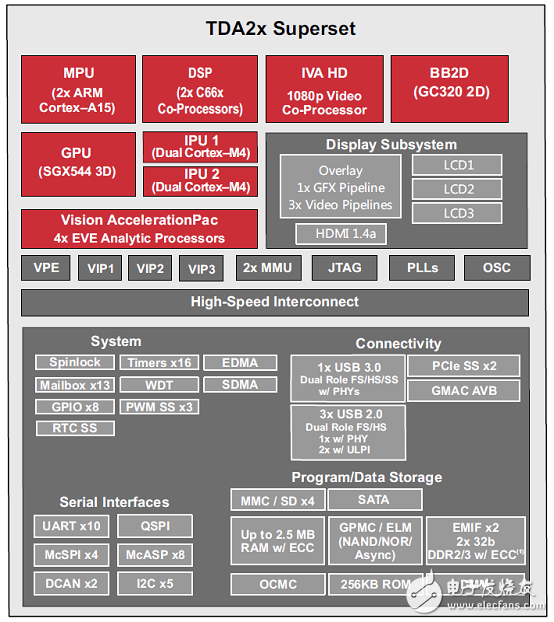
圖1.TDA2x系列框圖
評估模塊TDA2x EVM
TDA2x EVM is an evaluation platform designed to speed up development efforts and reduce time to market for ADAS applications. It is based on TDA2x SoC which incorporate a heterogeneous, scalable architecture that includes a mix of TI’s fixed and floating-point TMS320C66x digital signal processor (DSP) generation cores, Vision AccelerationPac (EVE), ARM Cortex-A15 MP Core? and dual-Cortex-M4 processors. Also it integrates a host of peripherals including multi-camera interfaces (both parallel and serial) for LVDS-based surround view systems, displays, CAN and GigB Ethernet AVB.
The main board integrates these key peripherals such as Ethernet, FPD-Link and HDMI, while the Vision application board provides interfaces for popular imagers.
Please note that a power supply is NOT included with the TDA2x Evaluation Module and needs to be purchased separately. A power supply with the following specs is needed:
12V DC output
5A output
Positive inner and negative outer terminals
Female barrel with 2.5mm or 2.1mm inner diameter and 5.5mm outer diameter, insertion depth is 8.85mm
圖2.評估模塊TDA2x EVM5777G-03-40-00外形圖
1.TDA2x EVM CPU 板
The TDA2x EVM is an evaluation platform designed to speed up development efforts and reduce time tomarket for ADAS applications. The TDA2x EVM is based on TDA2x System-on-Chip that incorporate aheterogeneous, scalable architecture that includes a mix of TI’s fixed and floating-point TMS320C66xdigital signal processor (DSP) generation cores, Vision AccelerationPac (EVE), ARM? Cortex?-A15 MPCore and dual-Cortex-M4 processors. Also it integrates a host of peripherals including multi-camerainterfaces (both parallel and serial) for LVDS-based surround view systems, displays, CAN and GigBEthernet AVB.
The main CPU board integrates these key peripherals such as Ethernet or HDMI, while the visionapplication daughter board and LCD/TS daughter board will complement the CPU board to delivercomplete system to jump start your evaluation and application development.
An EVM system is comprised of a CPU board with one or more application board(s)。 The CPU boardcan be used standalone for software debug and development. Each EVM system hasbeen designed to enable customers to evaluate the Processor performance and flexibility in the followingtargeted markets:
? Automotive Infotainment applications
? Automotive Vision applications
? Emerging End Equipment applications
The CPU board contains the (Jacinto 6/TDA2x) applications processor, a companion Power ManagementIC (TPS659039), Audio Codec (TLV320AIC3106), DDR3 DRAM, four different Flash memories (QSPI,eMMC, NAND and NOR), a multitude of interface ports and expansion connectors. The board providesadditional support components that provide software debugging, signal routing and configuration controlsthat would not be needed in a final product. Different version CPU boards will be built to support thedevelopment process that include:
? Socketed processor used for wakeup, early software development, quick and easy chip revisionevaluation
? Soldered-down processor used for high performance Use Cases and evaluations
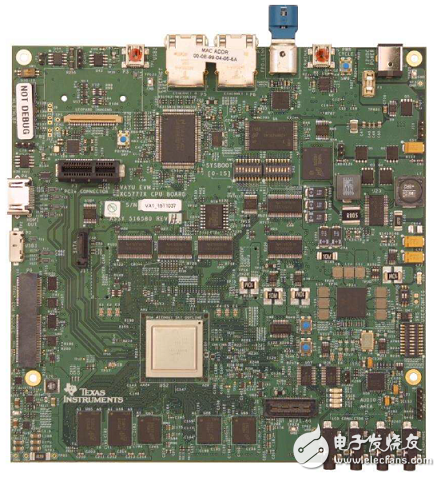
圖3.TDA2x EVM CPU 板外形圖
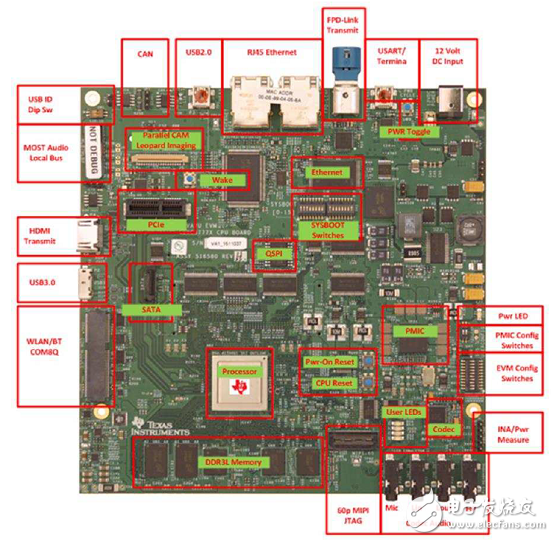
圖4. TDA2x EVM CPU 板主要元件分布圖
TDA2x EVM CPU 板主要特性:
? Processor:
– SoC (23mm x 23mm package, 0.8mm pitch with 28x28 via-channel array)
– Support for corresponding socket
? Memory:
– EMIF1 - DDR3L-1066 (with ECC): two 8Gbit (16bit data/ea) and one 4Gbit (8bit data, for ECC)memory devices
– EMIF2 - DDR3L-1066: four 4Gbit (8bit data/ea) memory devices
– QSPI (Quad SPI)
– eMMC
– NAND flash memory 16 bit
– NOR flash memory
– I2C EEPROM
? Boot mode selection DIP switch
? On-Board Temperature Sensor
– TMP102
? JTAG/Emulator:
– 60-pin MIPI Connector
– 20-pin-CTI adapter: 10 x 2, 1.27mm pitch
– 14-pin adapter: 7 x 2, 2.54mm pitch
? Audio input and output:
– AIC3106 codec: Headphone OUT, Line OUT, Line IN, Microphone IN
? Connectors and Transceivers:
– CAN Interface - 2-wire PHY on DCAN1
– Two USB Host receptacles:
? USB3.0 (micro-USB)
? USB2.0 (mini-USB)
– PCIe x 1
– Video - one HDMI Out, one FPD-Link III, one LCD
– MLB and MLBP on Mictor connector
– RS232 via USB FTDI converter (mini-A/B USB)
– COM8 connector
– Gigabit Ethernet PHY (RJ45) x 2
– MicroSD socket
– SATA
– I2C Expander
– LCD Daughter Board connector
? Power supply:
– 12 V DC input (Wall supply not supplied with Kit)
– Optimized Power Management IC (PMIC) Solution
– Support sleep mode with wake-up capability
? PCB:
– Dimension (W x D): 170mm x 170mm
– Expansion Connectors to support application boards
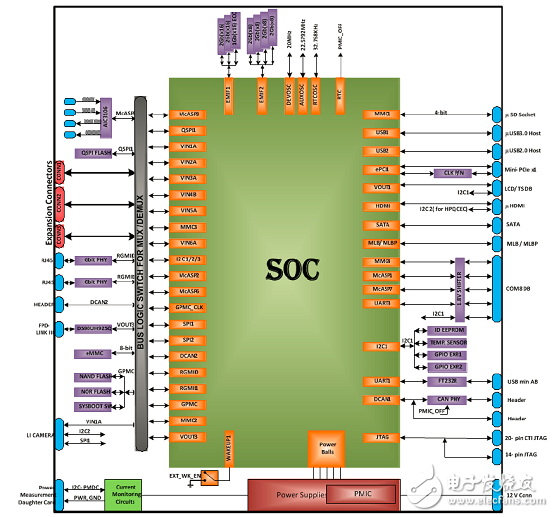
圖5. TDA2x EVM CPU 板功能框圖
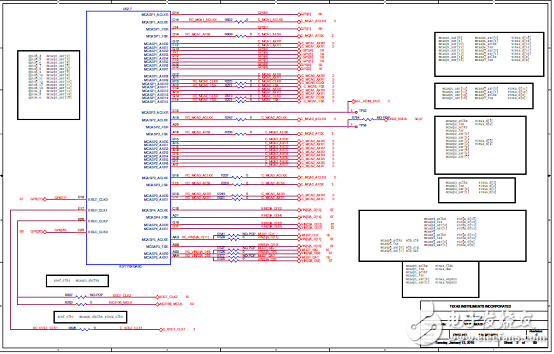
圖6. TDA2x EVM CPU 板電路圖(1)

圖7. TDA2x EVM CPU 板電路圖(2)
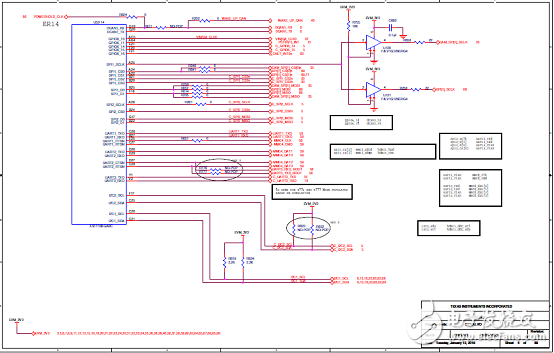
圖8. TDA2x EVM CPU 板電路圖(3)
其余80多個電路圖見: sprr210
2.VisionSuper28視頻應用板
The vision application board supports automotive vision video multiplexing options for different video inputsources. As the board supports multiple video inputs and multiplexing options, it is a solution for advanceddriver assistance systems (ADAS) development activity. This evaluation module (EVM) is based on TIVisionSuper28-series System-on-Chip (SoC) silicon solutions.
The vision application, based on the VisionSuper28 EVM, consists of the following:
? Application board
– Supports the multiplexing option for proprietary camera modules
– Supports FPD-Link III FMC DS90UB914Q daughter board for stereoscopic view and/or surroundview camera interface
– Supports HDMI and CAN interfaces
? FPD-Link III FMC DS90UB914Q daughter board
– Supports four high-resolution cameras for surround view
– Supports five or six lower-resolution cameras for surround and stereoscopic view
? VisionSuper28 CPU board
– Supports SoC
– Supports memory devices, other interfaces, and so forth
? Stand-alone camera module head boards
– AR0132AT6C00XPEAH-E head board from Aptina?
– OV10635 head board from OmniVision?
– Single-imager head board from Leopard imaging
– LI-M024-DUAL image head board from Leopard imaging (LI)
? Four surround-view image sensor head boards with serializer boards
? Stereoscopic-view image sensor head boards with serializer boards
? Linear guide rail to adjust the position of stereoscopic image sensor

圖9.VisionSuper28視頻應用板框圖
圖10.VisionSuper28視頻應用板外形圖
左:頂視圖右:底視圖
圖11.VisionSuper28視頻應用板和圖像頭板連接圖
VisionSuper28視頻應用板主要特性:
? Power supply
– 12-V DC input
– Power-on cycle sync-up with CPU board
? PCB
– Dimension (W × D): 170 mm × 140 mm
– Supports a multi-des card for surrounding view
? CPLD
– Multiplexing
– De-multiplexing
– Buffer
– Skew matching
– Control and status indication
? HDMI receiver – ADV7611 (Rev C and earlier use SiI9127)
? CAN transceiver
? Image sensors interface
– Aptina image sensor
– LI image sensor head boards with Aptina and OmniVision sensors
– OmniVision image sensor
? FPD-Link III FMC DS90UB914Q daughter board
– For stereoscopic view
– For surrounding view
? Linear guide rail
– For adjusting the stereoscopic view
? Connectors and headers
– CAN interface header
– HDMI receiver connecter
– CPLD JTAG connectors
– OmniVision imager head board connector
– LI imager head board connector
– Aptina adapter board connector
– Multi-des board interface connector
– 12-V power input connector
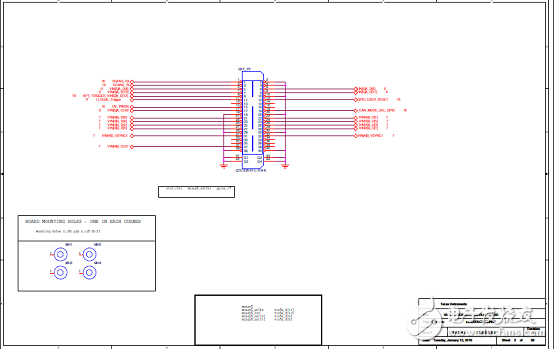
圖12.VisionSuper28視頻應用板電路圖(1)
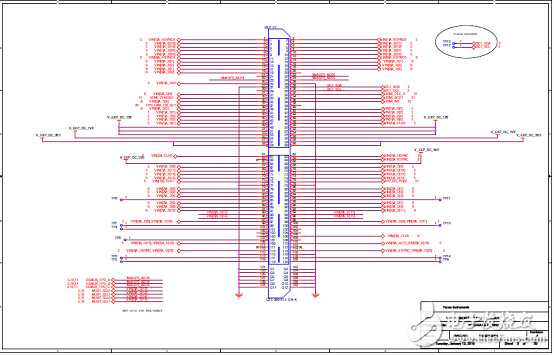
圖13.VisionSuper28視頻應用板電路圖(2)
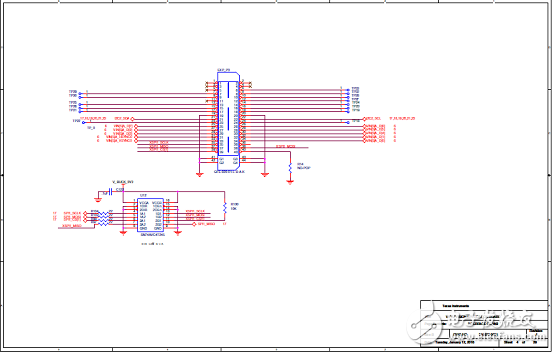
圖14.VisionSuper28視頻應用板電路圖(3)
 電子發燒友App
電子發燒友App

















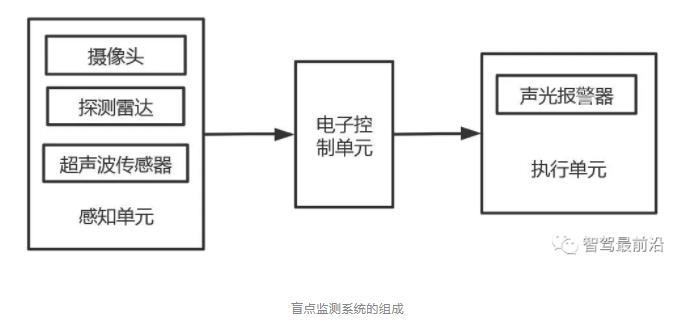











評論